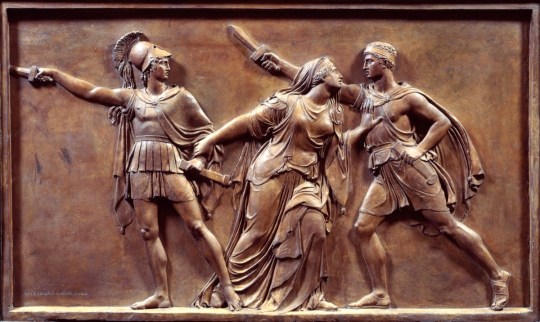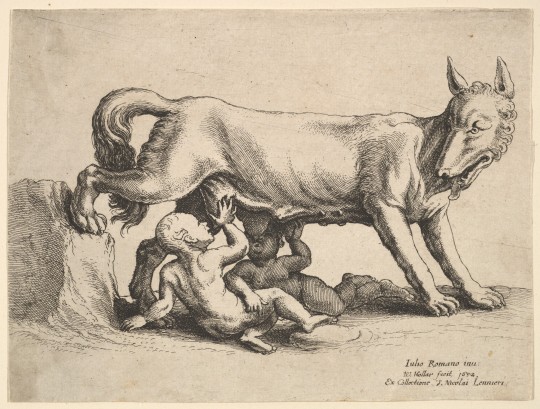#rené girard
Text
when rené girard says "violence and the sacred are inseperable" in his book violence and the sacred

213 notes
·
View notes
Text

There is great irony in the fact that the modern process of stamping out religion produces countless caricatures of it.
René Girard
#girard#rené girard#religion#secularism#postmodernism#christian heritage#the west#civilisation#society#spiritual#mimetic theory#french#philosopher
96 notes
·
View notes
Text
“The Eucharist is really related to sacrifice, but rather than representing the violence against the victim, of it being the victim that you eat, you eat the total refusal of violence, which is Christ.”
— René Girard
4 notes
·
View notes
Text
René Girard: The ‘jealousy’ that Cain feels toward his brother is inseparable from the deprivation of sacrificial outlet that defines the character. We can only deceive violence to the extent that we do not deprive it of all outlet, where we provide it with something to sink its teeth into.
'Adam Raised a Cain', Bruce Springsteen
French text on X/Twitter: films7
René Girard: “We can only deceive violence to the extent that we do not deprive it of all outlet, where we provide it with something to sink its teeth into. Perhaps this is what the story of Cain and Abel signifies, among other things. The biblical text provides only one detail about each brother. Cain tills the land and offers to God the fruits of his harvest. Abel is a shepherd; he sacrifices the firstborn of his flocks. One of the brothers kills the other, and it is the one who does not have this deceptive violence of animal sacrifice. This difference between sacrificial worship and non-sacrificial worship is truly one with God’s judgment in favor of Abel. To say that God approves of Abel’s sacrifices and does not approve of Cain’s offerings is to restate, in another language, the divine language, that Cain kills his brother while Abel does not.
In the Old Testament and Greek myths, brothers are almost always enemies. The violence they seem inevitably called to exercise against each other can only dissipate on third-party victims, sacrificial victims. The 'jealousy’ that Cain feels toward his brother is inseparable from the deprivation of sacrificial outlet that defines the character.”
youtube
Adam Raised a Cain (Bruce Springsteen Live at The Paramount Theatre 2009)
#bruce springsteen#songwriting#art#music#singer#springsteen#cain#abel#love#bible#god#sacrifice#violence#rené girard#old testament#jealousy#hate#jesus#Youtube
3 notes
·
View notes
Text








"Nous ne soupçonnons pas que le moindre couple de jumeaux ou des frères ennemis annonce et signifie le tout de la crise sacrificielle, qu'il est toujours partie prise pour le tout, au niveau non d'une rhétorique formelle mais d'une violence bien réelle : toute indifférenciation violente, si réduite soit-elle à l'origine, peut se répandre comme une traînée de poudre, détruire toute la société." René Girard, La violence et le sacre
Pietro Novelli, Cain Murders Abel ; Genesis 4 : 9 ; William Adolphe Bouguereau, The First Mourning ; Nicholas Tournier, Esau selling his birthright to Jacob for a pottage of lentils ; Genesis 25 : 23 ; John Gibson, Jocasta intervening between her Sons Etecoles and Polynices ; Aeschylus, Seven Against Thebes ; Wenceslaus Hollar, Romulus and Remus
#web weaving#words words words#poetry#art#classics#literature#tagamemnon#aeschylus#seven against thebes#old testament#judaism#bible#cain#abel#rome#ancient greece#rené girard#la violence et le sacré#the violence and the sacred#parallels#brothers
150 notes
·
View notes
Text
5 notes
·
View notes
Note
I recall you saying, or paraphrasing, that literature is “suspension of memesis outside time,” or something to that effect. Can you expand?
For some reason I can't find the post, but I think I was paraphrasing Mónica Belevan. She used mimesis primarily in René Girard's sense—social imitation, basically—to which I added Erich Auerbach's sense of "the literary representation of reality." At the risk of vulgarizing my or still more her point, I think we were getting at the idea of art's virtuality. It provides us a representation of the real for contemplation rather than as a model of imitation or a pretext for action, hence "outside of time," since we act and imitate in time. A very abstract idea, obviously, but the force and the use is of it for me is as a rejoinder to the perennial Platonic complaint that artistic mimesis is identical to Girardian mimesis, i.e., just a source of socially deranging and disordering this-worldly passions or desires, a vector of contagion. It also implies a basically modernist standard of value according to which the best art is the art that most achieves this temporal suspension by detaining us with intricacies or novelties of form. This is too austere a thesis for me to believe every day—surely art should be fun!—but on some days, I do believe it.
8 notes
·
View notes
Text
I miti a cui si attribuisce l'operazione di «inventare la morte» in realtà non la inventano, ma la distinguono nettamente dalla vita, mentre «in principio» l'una e l'altra sono confuse. Questo significa – credo –che è impossibile vivere senza morire, ossia che, ancora una volta, l'esistenza è invivibile.
— René Girard, Il capro espiatorio
3 notes
·
View notes
Text
Clausewitz’s treatise constantly shows that we must not believe in the “true history” that Hegel sees growing behind the ups and downs of “apparent history,” or the history that positivists describe as a national necessity or as progress. The real principle that is latent behind the alternating victories and defeats, behind the “philosophical trend,” behind the “pure logic” and “nature” of war is not a ruse of reason, but the duel ... The fight to the death is thus much more than a simple desire for recognition. It is not a master-slave dialectic, but a merciless battle between twins.
—René Girard, Battling to the End
.
“Carl von Clausewitz (1780–1831), the Prussian military theoretician who wrote On War, is known above all for his famous dictum: ‘War is the continuation of politics by other means.’ In René Girard’s view, however, the strategist’s treatise offers up a more disturbing truth to the reader willing to extrapolate from its most daring observations: with modern warfare comes the insanity of tit-for-tat escalation, which political institutions have lost their ability to contain.”
#rené girard#war#hegel#theory#Clausewitz#history#geopolitics#philosophy#political theory#political philosophy
16 notes
·
View notes
Text
due to budget cuts you now have to triangulate your desire with just 1 person
125 notes
·
View notes
Photo

Man is the creature who does not know what to desire, and he turns to others in order to make up his mind. We desire what others desire because we imitate their desires.
- René Girard (1923-2015)
Frnechman René Girard’s work has been enjoying a renaissance in recent years. He has long been recognised for his theory of human behaviour and human culture. In 2005 he was inducted into the Académie française, and in 2008 he received the Modern Language Association's award for Lifetime Scholarly Achievement. He was Professor Emeritus at Stanford University.
Back more than 50 years ago, René Girard started teaching French literature because he needed a job. He hadn't even read many of the books he was assigned to teach. Then, as he studied the classic novels of Stendhal and Proust with a fresh mind, staying one step ahead of his students, he was struck by a series of similarities from novel to novel. Unbound by any narrow research agenda, Girard discovered a simple but powerful pattern that had eluded sophisticated critics before him: imitation is the fundamental mechanism of human behaviour.
Stories thrive on conflict between characters. By reading the great writers against the grain of conventional wisdom, Girard realised that people don't fight over their differences. They fight because they are the same, and they want the same things. Not because they need the same things (food, sex, scarce material goods), but because they want what will earn others' envy. Humans, with a planning intelligence that sets them apart from all other animals, are free to choose. With freedom comes risk and uncertainty: humans don't know in advance what to choose, so they look to others for cues.
People can desire anything, as long as other people seem to desire it, too: that is the meaning of Girard's concept of "mimetic desire." Since people tend toward the same objects of desire, jealousy and rivalry are inevitable sources of social tension.
#girard#rené girard#quote#mimetic theory#sociology#philosophy#human condition#human nature#desire#wants#needs#imitation#copying#society#mimetic desire
79 notes
·
View notes
Note
where do you recommend starting with girard? i am interested in him but very intimidated by theory, i barely read any tbh. girard's most popularized stuff like mimetic desire seems so "obvious" and intuitive when you read summaries that its kind of inviting, but i suppose his work is probably much more complex than sound bites make it seem.
ive literally only read violence and the sacred so i guess that would be my rec as a starting point . i wouldn't rate girard's stuff as overly dense or complex as far as theory goes; if you're interested, you might as well at least try it and see how you fare. but honestly this is probs a question better posed to @catilinas if he feels like answering it !
7 notes
·
View notes
Text
“The dialogue between Peter and his persecutors becomes sharper and sharper; it is a form of competitive emulation or mimetic rivalry. The conflictive nature of the relationship does not make it less imitative; it is more imitative than ever. Since Peter cannot lose his Galilean accent, he must emphasize another kind of imitation. Why does he become vociferous in his denial of Jesus? His antagonists know the truth and he knows that they know. He is not trying to make himself believable or to intimidate anybody. By resorting to violence, he is not widening the rift with the people around the fire: he is trying to establish a bridge.”
— René Girard: “The Question of Mimesis and Peter's Denial”
5 notes
·
View notes
Text
Chacun se croit seul en enfer et c'est cela l'enfer.
René Girard, Mensonge romantique et vérité romanesque, "Les hommes seront des dieux les uns pour les autres"
7 notes
·
View notes
Quote
Comme le roman naturaliste, qui supprima le sujet au profit de l'objet, on voit surgir, après la Seconde Guerre mondiale en France, un roman métaphysique qui va au contraire peu à peu détruire son objet. Le roman se dévore lui-même.
René Girard, La conversion de l’art
2 notes
·
View notes
Text

La violence et le sacré, René Girard
#this book is so great I’m obsessed#anthropology#classics#words words words#rené girard#sacrifice#ritual#la violence et le sacré
2 notes
·
View notes